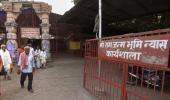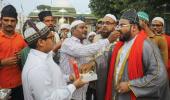The Uttar Pradesh government on Wednesday allotted five acres of land in Ayodhya district to the Sunni Central Waqf Board as directed by the Supreme Court.

The land is in village Dhannipur in tehsil Sohawal in Ayodhya on the Lucknow highway, about 18 kilometres from the district headquarters, state government spokesperson Shrikant Sharma told reporters.
The decision was taken at a cabinet meeting chaired by Uttar Pradesh chief minister Yogi Adityanath on Wednesday.
Meanwhile, the All India Muslim Personal Law Board said the Sunni Waqf Board is not the representative of the entire Muslim community and if it accepts the Centre's offer it should not be considered a decision of all Muslims of the country.
"Sunni Waqf board is not representative of entire Muslim community. If it takes land, it should not be considered decision of Muslims of the country," senior executive member of AIMPLB Maulana Yasin Usmani said.
He said AIMPLB and those associated with it have decided that they "will not take any land in Ayodhya".
The Uttar Pradesh Shia Central Waqf Board said that had the 5 acres of land allotted for the Sunni Central Waqf Board been given to them, they would have constructed a Ram temple in Ayodhya.
"Had the Shia Waqf board got the land, it would have constructed another Ram temple there," chairman of UP Shia Central Waqf Board Wasim Rizvi said here.
Rizvi stated that the government has fulfilled its responsibility and the Hindu community will get a Ram temple in Ayodhya.
"Meer Baqi, who was a Shia, had constructed the structure (mosque) but the land went to the Sunnis. It is the fault of Shias who had never raised their voice," he claimed.
Baqi was a commander during the first Mughal emperor Babur's reign.
The Babri Masjid was demolished at the site on December 6, 1992.
"When we raised our voice in the Supreme Court, there was a 71 year delay due to which five acres land, which should have been given to Shias went to the Sunnis," he said and hailed the Narendra Modi government for paving the way for construction of a Ram temple in Ayodhya.
While delivering the judgement on November 9, the apex court had said the trust should be formed within three months for the construction of the temple at the site.










